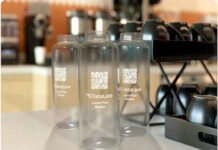The Sustainability Summit at the Beurs van Berlage began on the morning of 14 November with a keynote conversation between Virginie Helias, chief sustainability officer of Proctor & Gamble, and Tim Sykes, the editor of Packaging Europe. The conversation began with Helias outlining industry goals of reducing plastic use by 50% by 2030 and her own company’s goals to move to 100% recyclable materials.
Helias cited examples of meaningful progress such as the reduction of 46% in the plastic used by iconic brands such as Head & Shoulders shampoo. “We need to turn the use of recycled materials into a good story for consumers interesting for consumers, she said. Turning the iconic Head & Shoulders white container to a grey shampoo bottle reflected the use of recyclates and made it a bit more interesting for consumers,” she said.
Helias spoke of the move to paperboard cartons used for the Ariel Ecoclic cartons for its washing pods and Gillette’s cardboard where the competitors have similarly adapted their packaging. The Ecolic carton, apart from being easy for adults to open, is difficult for small children to open by mistake. The 50% reduction of water use with dishwashing powders was cited as another step in her company’s all-rounded environmental approach as well as water-soluble washes.
Irresistibly superior and more sustainable
She insisted that the brand innovations must be both irresistibly superior and more sustainable. Helias spoke about the Dawn Powerwash and EC30 water-activated swatches and explained that there were some innovations that didn’t make it or missed the mark – all because the execution lacked irresistible superiority.
Helias highlighted ground-breaking innovations such as VersoVita, a solvent-based advanced recycling technology transforming recycled polypropylene into a near-virgin state. “Now, it’s all about scaling these innovations to make an impact and rallying against the natural inertia to system change.”
On reusable packaging, Helias suggested that packaging standardization would help to make this frictionless consumer experience. There are several challenges. “Changing an economic system is not easy. It requires significant investments in cutting-edge technology, and there is the inertia that resists system churn. Recycling needs more scale.” Nevertheless, low carbon footprint and net-zero circularity are necessary, she asserted. “Let’s turn the impossible into the possible, let’s make it happen!”
Calling on brand owners and retailers to step up and join the HolyGrail2 pilot in France next year, Helias said, “We’re embedding digital watermarks into packaging for the ultimate test in real market conditions to drastically improve recycling rates. Another formidable challenge we collectively face is to qualify a reuse system that is economically and environmentally viable. We need all of us to crack it. Now is the time to be the change. All in!”











